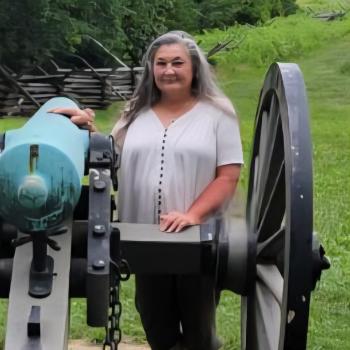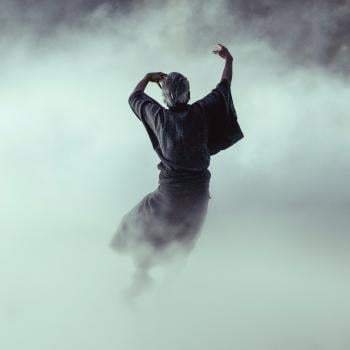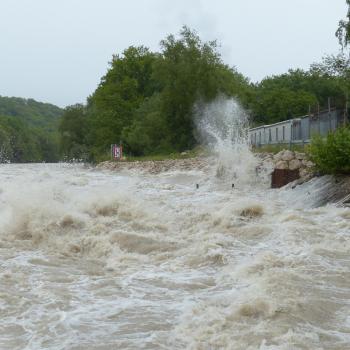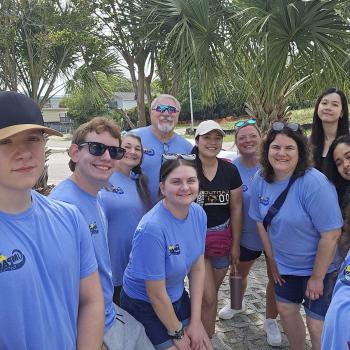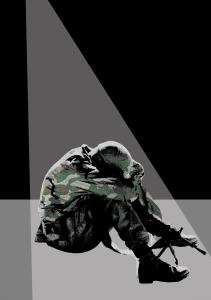
It is Mental Health Awareness Week. The theme for the week is Anxiety. Although most people deal with anxiety on some level, I wish to focus on anxiety in the military which often leads to further complications such as PTSD. The following is an article by my husband, Martin Green, which became the introduction for the book Into the Valley of the Shadow: A Soldier’s Military Journey and His Battle With PTSD by Joseph William Haynes (Hellgate, 2019). From his personal experience as a soldier who spent his entire career in US Army Special Operations based in the United States and in Germany, Green offers a very insightful look at the anxiety faced by many combat veterans as a result of their chosen profession.
Anxiety and Combat Veterans: Telling the Story
The memoirs of a military veteran are very special to both the veteran who writes them and the unit with which he served. Even the shortest of military tours evokes a feeling of pride and honor within the veteran. Every veteran has a unique story to tell, and with over 18.2 million military veterans still alive, that’s a lot of stories. Most will never be written down. Perhaps the individual does not have the opportunity or the necessary literary skills, or they lack a publicist who is willing to assist them in this process. So how will these stories be told?
The real problem here is not how to tell the story, but that the veterans do not always feel there is an audience to whom they can tell their stories, especially if that individual is a combat veteran. How is this a problem, you ask? Despite all the books and movies about war, the average citizen who has never experienced war can not relate, understand, or accept the agony, shame, and atrocities our soldiers face. They can not fully appreciate the amount of training and sacrifice the soldier must endure just to get to combat. Furthermore, to paraphrase Jack Nicholson’s character in A Few Good Men, “words like duty, honor, country, commitment, patriotism, and brotherhood” do not register in the hearts of the average civilian the way they do to a veteran. Unless you fully understand the concept of those ideals, you can’t understand what drives and motivates a soldier to be able to endure what he must in combat.
Combat Veterans’ Stories and Many Issues to Consider
As a combat veteran myself, I hear this all the time: “Why don’t you like to talk about your combat experiences?” I don’t because unless you walked in my boots on the same terrain with the same load under the same conditions, you could not understand exactly what I would tell you. It could not have the same meaning to you that it does to me. It also sets me (or any other veteran) up for your judgment, and if you weren’t there, you have not earned the right to make judgments. That does not make me a better person than you, or you a lesser person than me. It just means that to truly understand combat, you must experience it, and most combat veterans are happier not to expose you, or someone else for that matter, to the rigors and horrors of combat action.
Also, not all military experiences are meant for public knowledge due to Operational Security (OPSEC) protocol. I, personally, would not feel comfortable relating certain details of my military experience even though I have been retired for over twenty years because not everyone has a need to know. This is embedded in me. So the dilemma is that our veterans must carry many of their experiences within themselves, even though they would prefer to be able to tell their stories and be properly understood. This makes the average combat veteran particularly susceptible to anxiety disorders such as Post-Traumatic Stress Disorder (PTSD).
Our armed forces have been given the task to take sweet, innocent boys and girls and transform them into integral components of the most devastating war machine on this planet. They leave their homes and enter a world that is totally foreign to them. The cadre tear the recruits down and rebuild them to be lethal weapons; however, upon graduation from basic training, they don’t have all the skills they need to master proficiency in their chosen area of expertise. They are sent to their units where they are drilled night and day until their particular job skills become second nature. Both the officers and the non-commissioned officers (NCOs) of their units enact this with precision. Only then are the new soldiers sent out into the most hostile environments imaginable to meet the enemies of our country.
Combat Veterans and Many Battles to Fight
The climate and terrain alone would be hardship enough on the average person. Added to that is the weight and bulk of individual equipment that must be worn or carried. In addition, they must learn the customs of the host nation along with some basic language skills. Then there is the fact of seeing civilian populations living in the most disgusting conditions imaginable, in constant physical danger from both hostile and friendly forces, with minimal food, water, shelter, and medical supplies–true poverty. Daily, they encounter civilians and children who beg and plead for candy or pocket change or just a little attention; daily, the civilians and children, some of whom have become familiar, turn and attack with small arms or improvised explosive devices (TEDs). They hear of the attacks on their comrades and of the friendly casualties and deaths, always, always, always knowing somewhere deep inside that today could be their last day alive.
Gathering up the courage to get up every day and face these facts of life could challenge even the strongest of service men and women, but they do it willingly and with pride. They do it for love of country and for the love of their brothers and sisters in arms. Living this life for months at a time (six to twelve months on average), would be enough to scar them permanently. Add actual combat actions into the mix and you have the perfect recipe to ruin one’s emotional well-being.
It has been said that combat brings out the very worst and the very best of the individual, and at times, simultaneously. Fortunately for most, their training takes control of their minds and bodies, and with the heightened awareness brought on by adrenaline, the world begins to move in slow motion as their bodies continue on auto-pilot, responding to what was rigorously trained into them until the combat action is over.
Imagine, If You Dare
Imagine, if you can, the fear you would experience with all that fire power aimed at you. Imagine the shame you would feel for just feeling afraid when so many others are depending on your strength and courage. Imagine the loneliness you would feel at times with the weight of that responsibility on your shoulders because you are not only responsible for your own life, but the lives of your comrades, as well. Imagine the guilt you would feel over taking another human’s life–someone you never met or had a personal issue with, possibly someone you could have actually been friends with in another situation. Imagine the loss and sadness you would feel over the casualties taken by your unit. Imagine the horror you would feel as you contemplated becoming one of those casualties–Who will take care of my family? Who will console my loved ones? What will become of me if I am permanently disabled?
Combat Veterans and the Old Crisis
Does the average combat veteran have an outlet on which to unload this? Not always. Our combatants are trained to be “hard core.” Sometimes they are ashamed to admit to their brothers and sisters that they are afraid. They don’t want to let them down or leave doubts in their team members’ minds as to their reliability. They dare not show any weakness, so they learn to be “stuffers.” They stuff those “unacceptable” feelings away into their inner psyche where they wear away at the individual’s internal stability, making it hard to function at times.
Some, however, find positive outlets into which they can release this negative energy (coping skills), hopefully finding balance. Others may be lucky enough to have a sympathetic ear to hear them out without judgment or disapproval and without fear of being “ratted out” to their peers.
Unfortunately, some have no other choice than to continue to stuff until they can’t stuff any more, at which time they either mentally explode or shut down and become combat casualties because of their mental health.
In years past, PTSD did not receive the attention that it is receiving now. Combat veterans suffering from “shell shock” or “combat fatigue” were viewed as cowards or weaklings and were whisked away unceremoniously so they would not contaminate their brothers and sisters in arms. In most cases, they did not receive adequate care and were sent home for their families and communities to deal with them.
Combat Veterans and the Current Crisis
Today, psychiatrists and psychologists are able to treat this disorder with medications and counseling, treatments designed specifically to restore the patient’s quality of life, but it is up to the combat veteran to choose whether they want to be treatment warriors and learn ways to go on with their lives or to be victims and become emotionally crippled. The best advice I was given came from a VietNam veteran who told me, “You have to learn to live despite the baggage you carry. You choose to get on with your life or become permanently disabled.”
Some are ashamed of the stigma that used to be attached to mental health treatment and refuse to seek the help that is available to them. Others may not realize that they have a disorder or may try to ignore it, putting themselves and others at risk. Still others may be afraid of the cost of treatment. Sadly, some consider suicide their only option.
Hope!
There is hope. The Veterans Administration, community mental health facilities or hospitals, and organizations such as Wounded Warriors are available to provide services for veterans. They only need to seek out this help or be assisted to get to these services by their family members or support network.
Help is available both medically and financially. We must learn to protect our own and to aid and encourage them to get the help they need.
–Martin Green U.S. Army Special Operations, Retired
God bless you. Please pray for our troops and our veterans.




